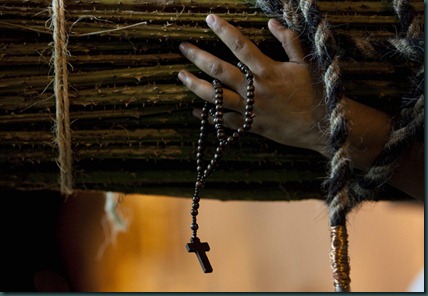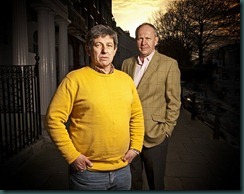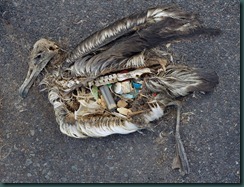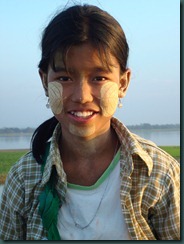Thoughts about what it means to pursue a life that includes faith, justice, peace, integrity, and sustainability.
Saturday, March 31, 2012
This Is My Commandment
If you are facing conflict in your personal life, your professional life, or in your church congregation, you are not alone! There is division and dissension among Christians and in churches across the United States. The key issue in every dispute is not whether conflict will happen, but how we will respond to it when it does happen.
Friday, March 30, 2012
The Politicization of Environmental Concerns
7 “But ask the animals, and they will teach you, or the birds in the sky, and they will tell you; 8 or speak to the earth, and it will teach you, or let the fish in the sea inform you. 9 Which of all these does not know that the hand of the LORD has done this? 10 In his hand is the life of every creature and the breath of all mankind. 11 Does not the ear test words as the tongue tastes food? 12 Is not wisdom found among the aged? Does not long life bring understanding?
Job Ch. 12
Sustainability and Sustenance (Musings on Life In Burma)
It’s February of 2008. We are living our last few months in China before returning home to live in the USA. It’s now or never. We get our visa and book our flight to Burma – now known as Myanmar – for our Chinese New Year Holiday. Several days after beginning our journey, we arrive at the airport closest to Lake Inle, in the Southern Shan State of Myanmar. Our guide, Ko Zahn, greets us warmly and asks if we would like to see Pindaya Cave, which has one of the largest single collections of Buddhas in the world.
Wednesday, March 28, 2012
The Conditions of Forgiveness
A few days ago, I wrote [here] about the requirement of Matthew 6:12 that we forgive, as we have been forgiven. And then, a few days after that I wrote [here] about the requirement in Matthew 5:23-24, that we affirmatively seek out those whom we have wronged and ask for their forgiveness. When read together, the effect of these two passages is even more striking than either one read alone.
Tuesday, March 27, 2012
The Sin of Self Sufficiency?
To those who put their faith in things besides God, the prophet exclaims (specifically, in verses 12 and 13):
I propose that the problem for modern day, First World inhabitants, is not that we may have financial savings or fitness goals, but rather what we put our faith in. Do we think these things can save us? Do we think that financial security or physical fitness are the primary factors which will determine our success in life? If we do, we need to think harder and better about what it is that is important in life, really and overall.
I suggest that instead of focusing on what we give up when we lack savings or health, or any other thing we are tempted to idolize, instead we need to be more aware of the valuable things we give up when we substitute the temporary and visible for the permanent and intangible. When we seek to depend on ourselves and on our temporally based idols, we give up immense possibilities for inner depth, compassion, and community that comes from reliance on things outside our own control, reliance on Others to do God's will.
Father Richard Rohr, speaking about modern day idols, has written,
"I would say that our real failure is not so much greed (although it is that, too) as self sufficiency, arrogance, and superficiality. Inner depth, compassion, and community died in many of us. We might call the thing that died a capacity for simple presence--presence to ourselves, to others, to the moment, and to inherent joy. That is the death of the soul for sure, and eventually of society."

Gain perspective. Trust God. Rely more on community, on generosity. Develop deeper understandings. Be present, simply present. Pray about this!
Excerpt from the article, A Crisis of Prosperity: Could Small Again Be Beautiful? by Father Richard Rohr (accessed March 20, 2012). AP Photo of a penitent man bearing a cross made of a cactus, by Gregory Boyle, accessed HERE
Monday, March 26, 2012
A Good Rule
I had just finished college. Just before starting my first job, I had made an appointment with the eye doctor. While waiting in his waiting room, I picked up a Life Magazine to read it. There was a spread in the magazine about a nun in India. Her name was Mother Teresa. The interview contained this quote. It was not separated out from anything else she said, but it struck me so much that I wrote it down and then memorized it:
“Do your work as if everything depends on it.
And then leave the rest to God.”
Daily, that seems to put things in perspective for me. I hope you find it inspiring, as well.
Sunday, March 25, 2012
Forgiveness (a poem by Ann Weems)
arrogantly
self righteously
I didn’t understand.
I didn’t see your pain.
that you’re the one
to bring the flowers?
Saturday, March 24, 2012
Choose Life! (Reflections on Deuteronomy 30:19)
Choosing life is much broader, however, than such a narrow construction of the word “life” might imply. Consider, as just one example of “choosing life,” the words of Deuteronomy Chapter 30:
Friday, March 23, 2012
Our Perpetual Duty
Leviticus 25:23-24
Vincent Van Gogh, Die Ernte (in Provence), 1888, National Museum of Amsterdam
A few weeks ago, guest blogger Kienan Mick made a few observations regarding the relation between capitalism and sustainability (HERE). Among other things, he pointed out that the economic cost of anything needs to include its cost over the long haul, for future generations. A calculation of value that fails to include this cost does not reflect the true cost of a practice. Writer Haruki Murakami (HERE) similarly pointed out that it is a moral error for a society to pursue “efficiency” without regard to more fundamental values that guide our choices about how we want to live and what we want to stand for. He points out that what is “right” is not always what is expedient or efficient. In fact, to do the right thing may sometimes be downright unattractive.
Thursday, March 22, 2012
The Feast of Justice (The Fast of Isaiah 58, Part V)
Wednesday, March 21, 2012
Update on Ryan Boyette, Sudan, and Nuba Mountains
This blog post is an update.
Tuesday, March 20, 2012
The Bounty of Forgiveness (The Fast of Isaiah 58, Part IV)
Today, I’d like to point to a real-life story of how this has worked in the lives of two specific, modern people, Peter Woolf and Will Riley.

Monday, March 19, 2012
The Fast of the Righteous (The Fast of Isaiah 58, Part III)
him to do (okay, injecting some imagination here, but bear with me). I
Sunday, March 18, 2012
Acceptance of Grace (The Fast of Isaiah 58, Part II)
A few days ago, I quoted Isaiah Chapter 58 as suggesting the proper attitude for our fasting during Lent.* That chapter contrasts fasting with an improper attitude, which God hates, with the proper attitude that one should have for a fast. Strikingly, the activities mentioned as illustrating proper attitude toward the fast (share food with the hungry, provide shelter for the homeless, clothe the naked) have nothing to do with our own consumption of food.
Saturday, March 17, 2012
Prayer of Thanksgiving
Peace At the Altar
Given that there are many possibilities about what it means to approach an altar and make an offering, I think it's worth having a discussion about what, exactly, we are doing when we examine ourselves and seek atonement during the Lenten season.
Friday, March 16, 2012
“But Lord, Why Me?”
“God Appears to Moses in Burning Bush,” St. Isaacs Cathedral, St. Petersburg, courtesy Wikimedia Commons
Have you ever felt called or inspired to do something, but worried that you were not quite up to the job? If so, this post is for you.
Wednesday, March 14, 2012
A Lesson from Fukushima
Tuesday, March 13, 2012
The Link Between Forgiveness and Peace
Monday, March 12, 2012
Pray for Peace
Today, on the 20th day of Lent, I read from Pope John Paul’s speech on the occasion of the World Day of Peace, January 1, 2002:
Sunday, March 11, 2012
Fasting for Lent (The Fast of Isaiah 58, Part I)
Saturday, March 10, 2012
Justice and Peace Shall Kiss
Friday, March 9, 2012
The Most Powerful Weapon
Dr. King: “Very definitely. Very definitely. I feel that organized nonviolence is the most powerful weapon that oppressed people can use in breaking loose from the bondage of oppression.”
Thursday, March 8, 2012
Women’s Reproductive Rights
Wednesday, March 7, 2012
The Wind
| Photo courtesy NOAA |
Tuesday, March 6, 2012
Listening to God
In matters of faith, only one voice matters. How will we discern that voice?
Psalm 46 says: “Be still and know that I am God.”
Be still.
We modern folk are such poor listeners. We label each other, we talk past each other, we judge each other, we jump to conclusions, we stop listening.
We want to be heard, we want everyone else to listen to us, we talk to whomever will listen.
Stop.
Listen.
No, really, I mean it! Stop talking (mentally even) and … just …
Listen.
This song (linked below) reminds us just to take it in, and to give it back. Not to tell others or to tell God how it is or what we want, sometimes not even to tell God what we need.
Sometimes, we are just to
Listen
And, if we respond, our response is to “lift a hymn of grateful praise.”
Nothing more, nothing less.
In thought, word, and deed, let us praise our God. As it is said in Psalm 19:14:
Monday, March 5, 2012
Plastics In Our Oceans

Sunday, March 4, 2012
Ocean Acidification
It reminds us that even though the earth seems limitless, it is not.
It is like a boat, and we all share it.
Or, it’s like a terrarium or, it’s like a fish tank. I personally am hooked on the fish tank analogy because of an experience I had first as a child and then as an adult, both involving fish tanks.
Saturday, March 3, 2012
Smack Down the Hate and Fear Drivers in Politics
Hear what Michael Higgins, President of Ireland, has to say in response to those whose allegiance is to power rather than to truth, people who incite fear rather than faith. He specifically names Sarah Palin, but I can think of more. Can you?
What can we do about this? Let’s just say that democracy, if it is to work, depends on participation by all its citizens, not just on their voting once in awhile. When was the last time you participated in selection of a candidate for inclusion of their name on the ballot? When was the last time you made a comment on pending legislation?
The last time I went to a precinct meeting of a polical party, one other person and I sat on a park bench and talked. That's not how it should be! Democracy is not a TV, spectator sport! Those people appearing on TV were placed there by the people attending those precinct meetings!
If you and I are not participating in the game -- if the moral middle has opted out of the system for whatever reason -- then we shouldn’t be surprised when the debate is controlled by the wingnuts! The sad thing is, if we don't participate, we are dooming our democracy to death by starvation.
Whose Earth?
"The earth is the Lord's and the fullness thereof." Psalms 24:1
(Photo by Mark Schmerling)
“The land is mine and you are but aliens and my tenants. Throughout the country that you hold as a possession, you must provide for the redemption of the land.” Lev. 25:23-24.
Q: What can we do about this?
A: Turn off some light bulbs
(and take other actions to conserve energy)
B: Support the use of alternate, sustainable sources of fuel
Thursday, March 1, 2012
The Girl Effect Fact Sheet
Something is not right in the world, is it? Generally speaking, if one wants things to change, one must figure out what to change. This leads to
THE GIRL EFFECT
As women have gained power and influence in the world, societies have changed. This has begun to be noticed. In general, sociologists began to notice, the higher the status of women in a society, the higher its overall statistics. Across the board. Life expectancy, health, education, etc. Why?
THE GIRL EFFECT
Learn about it! I quote now straight from the Fact Sheet at http://www.girleffect.org/uploads/documents/1/Girl_Effect_Fact_Sheet.pdf as follows:
Little research has been done to understand how investments in girls impact economic growth and the health and well-being of communities. This lack of data reveals how pervasively girls have been overlooked. For millions of girls across the developing world, there are no systems to record their birth, their citizenship, or even their identity. However, the existing research suggests their impact can reach much further than expected.
THE RIPPLE EFFECT
When a girl in the developing world receives seven or more years of education, she marries four years later and has 2.2 fewer children. (United Nations Population Fund, State of World Population 1990.)
An extra year of primary school boosts girls’ eventual wages by 10 to 20 percent. An extra year of secondary school: 15 to 25 percent. (George Psacharopoulos and Harry Anthony Patrinos, “Returns to Investment in Education: A Further Update,” Policy Research Working Paper 2881[Washington, D.C.: World Bank, 2002].)
Research in developing countries has shown a consistent relationship between better infant and child health and higher levels of schooling among mothers. (George T. Bicego and J. Ties Boerma, “Maternal Education and Child Survival: A Comparative Study of Survey Data from 17 Countries,” Social Science and Medicine 36 (9) [May 1993]: 1207–27.)
When women and girls earn income, they reinvest 90 percent of it into their families, as compared to only 30 to 40 percent for a man. (Chris Fortson, “Women’s Rights Vital for Developing World,” Yale News Daily 2003.)
Population Trends
Today, more than 600 million girls live in the developing world. (Population Reference Bureau, DataFinder database, http://www.prb.org/datafinder.aspx [accessed December 20, 2007].)
More than one-quarter of the population in Asia, Latin America, the Caribbean, and sub-Saharan Africa are girls and young women ages 10 to 24. (United Nations Department of Economic and Social Affairs, “World Population Prospects: The 2006 Revision,” http://esa.un.org/unpp, and “World Urbanization Prospects: The 2005 Revision,” www.un.org/esa/population/publications/WUP2005/2005WUP_DataTables1.pdf.)
The total global population of girls ages 10 to 24 — already the largest in history — is expected to peak in the next decade. (Ruth Levine et al., Girls Count: A Global Investment & Action Agenda [Washington, D.C.: Center for Global Development, 2008].)
Educational Gaps
Approximately one-quarter of girls in developing countries are not in school. (Cynthia B. Lloyd, ed., Growing Up Global: The Changing Transitions to Adulthood in Developing Countries [Washington, D.C.: National Academies Press, 2005].)
Out of the world’s 130 million out-of-school youth, 70 percent are girls. (Human Rights Watch, “Promises Broken: An Assessment of Children’s Rights on the 10th Anniversary of the Convention on the Rights of the Child,” www.hrw.org/campaigns/crp/promises/education.html [December 1999].)
THINK ABOUT IT
http://www.girleffect.org/uploads/documents/1/Girl_Effect_Fact_Sheet.pdf





